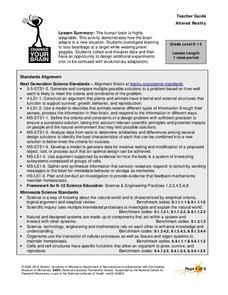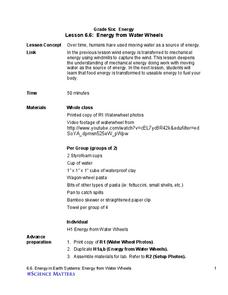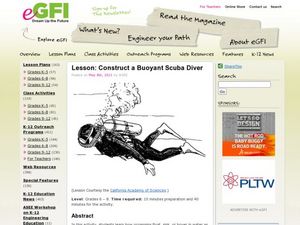Virginia Department of Education
A-Mazing Plants
Have your young scientists questioned why plants grow a particular way? Through this learning opportunity, scientists gain firsthand knowledge about how plants develop and various factors that affect rates of growth as they bring plants...
Illustrative Mathematics
Accuracy of Carbon 14 Dating II
The scientific issue of carbon-14 dating and exponential decay gets a statistics-based treatment in this problem. The class starts with a basic investigation of carbon content, but then branches out to questions of accuracy and ranges of...
University of Georgia
Antacid and Uncle Heartburn
Household materials can be used for more than cleaning! In this collaborative experiment, emerging chemists use products such as vinegar and liquid antacid to explore chemical reactions that commonly occur in the human body.
Berkshire Museum
Adopt a Schoolyard Tree
Help young scientists connect with nature and learn about trees with a fun life science lesson plan. Heading out into the school yard, children choose a tree to adopt, taking measurements, writing descriptions, and drawing sketches of it...
American Physiological Society
What Environmental Conditions Lead to the Hatching of Brine Shrimp?
Will changing the environment in which brine shrimp live impact their reproductive success? Young scientists get hands-on experience studying the habitat of brine shrimp in a two-week immersion lesson. The teacher's guide provides all of...
University of Minnesota
Altered Reality
Fascinate young life scientists by showing them how their brain learns. By using prism goggles while attempting to toss bean bags at a target, lab partners change their outlook on the world around them, producing amusing results....
Space Awareness
Water is a Heat Sink
One of the key objectives of Europe's Copernicus Earth program is to monitor the temperatures of the oceans and seas on Earth. Young scholars learn the effects of different heat capacities through two experiments. These experiments...
Curated OER
The Great Depression and Everyday Life
Examine everyday life during the Great Depression, as well as the effects if the Depression on American population, society, and economy. Learners write who, what, where, when, and why summaries of a person who relocated to California...
Curated OER
About Life: The Photographs of Dorothea Lange Going to the Promised Land
To better understand the migrant experience during the Great Depression, pupils analyze two primary resources: photographs by Dorothea Lange and a U.S. Map that shows the Dust Bowl. They compare and contrast Lange's images to Steinbeck's...
S2tem Centers SC
Seasons
Winter, spring, summer, and fall—take the learning of the seasons beyond the elementary level to the middle school classroom. Curious learners begin by watching videos about the seasons and the rotation of planet Earth. Then, they...
Curated OER
More on Conduction and Convection
Why do some items feel colder when they are the same temperature? How should you keep your soda cold? What makes the wind blow? These are just some of the things middle schoolers discover when completing a lesson plan on conduction and...
Science Matters
Energy from Water Wheels
Historians believe the first vertical water wheel was invented in Rome during the Augustan Age. The sixth lesson in the series of 10 has scholars experiment with designing their own water wheels. Through testing various pastas and...
Curated OER
Construct a Buoyant Scuba Diver
Groups of young oceanographers get to use action figures to experiment with the property of buoyancy! This memorable lesson plan provides detailed background information, a link to the laboratory worksheet, and thorough instruction...
San Francisco Public Utilities Commission
Water from the Well
How much water does it take to brush your teeth? How about to wash your clothes? Perform an experiment that measures water usage in everyday tasks and compares them to the days before indoor plumbing, specifically the California gold...
NOAA
Journey to the Unknown
Go where no one has gone before. Learners experience what it is like to be a scientist exploring new territory. Using audio and a scripted text, pupils take a trip in the depths of the ocean. They follow their trip with a hands-on...
Curated OER
Where Has It Been? Tracking the Ivory-Billed Woodpecker
By studying the assumed extinction, and subsequent rediscovery of the Ivory-billed Woodpecker, learners use maps and come up with a scenario for the rediscovery of the bird. This incredibly thorough lesson plan is chock-full of...
Education Outside
Leaf Adaptations
Long life or a fast life cycle? Class members each gather a leaf, observe its characteristics such as texture, surface, scent, design, shading, and size and then discuss the adaptations made for survival as well as what the leaf reveals...
Santa Monica College
Chemical Equilibrium and Le Chatelier’s Principle
Henri-Louis Le Chatelier wrote many papers throughout his 85-year life, but he is remembered for one of his earliest discoveries, now known as Le Chatelier's Principle. The final lesson in an 11-part series encourages young chemists to...
Nuffield Foundation
Assessing Human Hearing
Young scientists explore hearing through multiple experiments, demonstrations, and activities. They focus on the changes in hearing over a lifetime, how we can determine where a sound is coming from, and the ability to filter noises.
Nuffield Foundation
How Much Energy Is There in Food?
People associate calories with food, but what is a calorie? Young scientists measure the number of calories in samples of food to better understand the concept. They test a variety of samples, take measurements, and compare their results...
Curated OER
Using Environmental Models to Determine the Effect of Acid Rain on an Ecosystem
Demonstrate to your middle school science learners how chalk breaks down in a weak acid. Discuss what affects acidic rain might have on ecosystems. Lab groups then choose one of two questions: "How does acid precipitation affect an...
Captain Planet Foundation
George Washington Carver and the Sweet Potato
Learn about George Washington Carver's important contributions to agriculture by studying the sweet potato. First graders read about the inventor's observations and prepare sweet potato slips for the class garden. Additionally, they...
NASA
Decomposers Get Energy From Dead Things
When life gives you mold, make penicillin. Scholars design an inquiry experiment to determine what causes rotting and mold growth. It also covers decomposers and the important role they play for other living things.
Curated OER
States Of Matter
Delv into the states of Matter. Students engage in the scientific inquiry process to uncover the exciting world of Matter. They watch a series of videos, and conduct experiments in order to collect and analyze data on the various state...

























